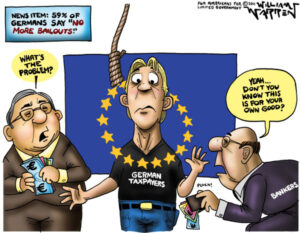
Last time, it occurred in May when the International Monetary Fund (IMF) proposed that unsecured bondholders of Irish debt take losses on their holdings, a plan vetoed by Geithner, as revealed by University College Dublin’s Morgan Kelly.
Now, as highlighted by the UK Telegraph’s Ambrose Evans-Pritchard, Geithner is again speaking up, telling European leaders that “The threat of cascading default, bank runs, and catastrophic risk must be taken off the table.”
Geithner’s intrusion is an admission that what happens in Europe will most certainly affect us here. Unspoken is that counterparty risk arising from credit default swaps sold by American financial institutions insuring against Greek and other troubled sovereigns’ defaults will be invoked, leading to catastrophe here.
This in turn means the problem is not merely contained to Greece, Portugal, or Ireland, it is a problem of these nations’ creditors in France and Germany. And because they purchased the insurance policies from U.S. institutions, if they are called in, U.S. banks, like Bank of America, Goldman Sachs, and AIG, will again be on the hook for hundreds of billions of dollars of losses.
Meanwhile, in Europe, default is inextricably linked to the failure of the euro zone itself. So, European leaders and financial institutions are scrambling against time attempting to put a bailout regime in place they believe is sufficient to cover all potential losses stemming from the crisis. At least, they hope.
The Geithner plan, according to Evans-Pritchard, involves the €440 billion European Financial Stability Facility (EFSF), which will be magically leveraged by financial institutions up to €2 trillion by the European Central Bank (ECB) to cover potential losses in Italy and Spain. This is similar to how the Troubled Asset Relief Program was leveraged by U.S. financial institutions from $700 billion to $7 trillion to recapitalize the banks in 2008, as was recently revealed by publisher Steve Forbes.
It’s an idea that could only be made in America.
Evans-Pritchard writes, “The multi-trillion package now taking shape for Euroland was largely concocted in Washington, in cahoots with the European Commission, and is being imposed on Germany by the full force of American diplomacy.” So, despite opposition by the German people to any further bailouts — 76 percent are opposed in a recent poll — that decision is being taken out of their hands by none other than the Obama Administration.
This means that the international financial elite — which includes the U.S. Treasury Secretary — are willing to sell out whole countries, an entire continent even, to save themselves. If Greece for example were to restructure its debts and leave the euro, it would be harsh, perhaps cataclysmic, on U.S. and European banks.
So instead, they want to put the German people on the hook for insuring the debts of the entire euro zone. What is the price of the €2 trillion bailout? No less than the sovereignty and liberty of the people there.
What’s worse is that the EFSF is only a stop-gap measure. Under the plan, with the banks recapitalized, presumably they’ll be able to handle Greek, Portuguese, and Irish debt restructuring — i.e. default. They think.
More likely, it will require follow-up action as the crisis spreads into Italy and Spain. Bank recapitalization was not enough to stem the crisis in the U.S., either. Afterward, the Federal Reserve stepped in to purchase outright $1.25 trillion of mortgage-backed securities from financial institutions all over the world. $447 billion of that was bought from foreign institutions.
So, upcoming votes in European parliaments are not likely to be the last to contain the crisis. But they may not even get that far. The head of Germany’s constitutional court has bluntly told the world that these moves violate Germany’s sovereignty.
“The sovereignty of the German state is inviolate and anchored in perpetuity by basic law. It may not be abandoned by the legislature (even with its powers to amend the constitution),” Andreas Vosskuhle said in an interview with Frankfurter Allgemeine.
“There is little leeway left for giving up core powers to the EU. If one wants to go beyond this limit — which might be politically legitimate and desirable — then Germany must give itself a new constitution. A referendum would be necessary. This cannot be done without the people,” he told the newspaper.
This comes after a court ruling there indicated than an expansion of the euro zone into a fiscal union would violate the German constitution. Vosskuhle may very well be saving Europe — from itself.
After all, none of these questions have been put to the people of Germany and elsewhere throughout the European Union — who are expected to bear the costs of the bailouts. Instead, the decisions are being cooked up behind closed doors in Washington, D.C. and Brussels.
And the cost is indeed high. Do the German people want to be debt slaves for the entire euro zone? Do they wish to sacrifice their sovereignty to a financial elite that is neither visible nor elected?
Europe’s last hope is that they turn back from this precipice of rule by these international financial institutions. No less than the liberty of the free peoples there is at stake.
Bill Wilson is the President of Americans for Limited Government. You can follow Bill on Twitter at @BillWilsonALG.






